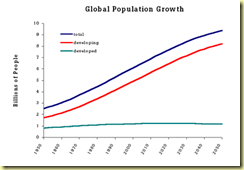May and Guengant, in a commentary (Africa's greatest challenge is to reduce fertility) in today's FT, argue that reducing fertility in Africa is the key to Africa's development and its prospects for full integration into the global economy.
Sub-Saharan Africa -- Population Projections
...The persistent high fertility levels imply that population growth will continue despite the Aids epidemic. In mid-2007, sub-Saharan Africa had 788m people – 12 per cent of the world’s population. This share will increase to 18 per cent in 2050, or 1.8bn people. This assumes that African women would then have 2.5 children on average, against 5.5 today, according to the United Nations 2006 population projections. However, these projections imply rapid declines in fertility levels that are far from guaranteed, except in southern Africa. Higher 2050 population figures, potentially reaching 2bn or more, are plausible if fertility declines more slowly.
...slower population growth will help reduce the pressures countries face with food security, land tenure, environmental degradation and water supply...It will also ease the security problems that are often the result of conflicts over scarce resources, which are exacerbated by unsustainably high rates of population growth and widespread youth unemployment.
...growth rates in the order of 6 per cent per year translate into only half that level per capita because of the current pace of demographic growth...Unless fertility declines, attainment of the millennium development goals will remain an ever-receding mirage.
Doesn't this resonate old-school Malthusian arguments? Greg Clark makes similar kind of arguments in his book A Farewell to Alms. Though true that population increase impacts poverty reduction efforts, especially if fertility is high among poor neighborhoods, I do not think that it is a sticking bone to Africa's development. Does this mean that we should abandon all our livelihood generation and economic development efforts and focus on reducing fertility rates? With more than 24.1% of the population suffering from HIV/AIDS and population growth rate of around 1.4% in Botswana, I don't think fertility is a hinge to Botswana's development. We have clearly seen that improvements in political and economic institutions led to an impressive growth rate of over 5% in almost three decades in Botswana, which is seen as an example of how good institutions lead to high growth rate and development. Putting the whole blame on population growth for stagnant development is not fair to the African continent. The continent lacks (also fails) development because of political instability, HIV/AIDS, bad institution, natural resource curse (chiefly oil and diamond) followed by widespread corruption, low level of education, bad infrastructure, lack of rule of law, and adverse climatic conditions, among others. Also check out Paul Collier's book The Bottom Billion: Why the Poorest Countries are Failing and What Can Be Done about It and the development traps (conflict, natural resources, landlocked with bad neighbors, and bad governance). If you can't get hold of Collier's book, then check out this review- the blogger does a good job summarizing the book.

P.S.: For those who are interested in the role of institutions and how it shapes economic policies, plus the top-down and bottom-up approach, see this recent paper by William Easterly: Institutions: Top Down or Bottom Up
